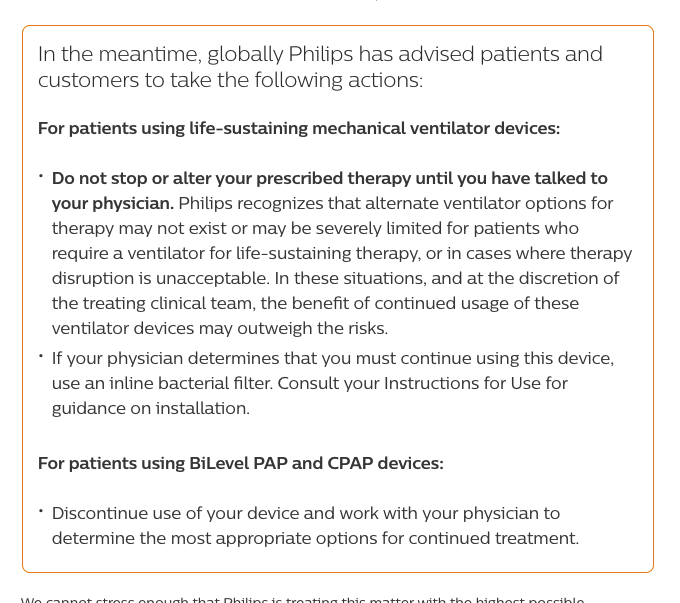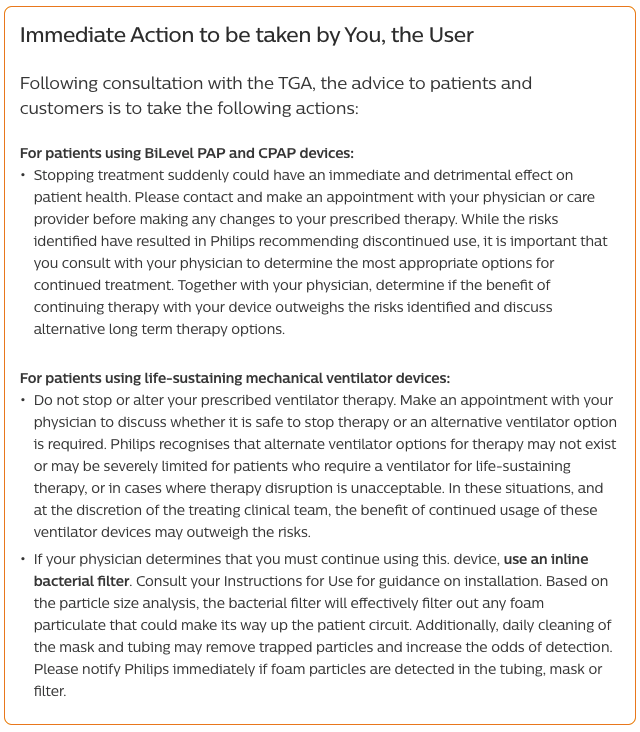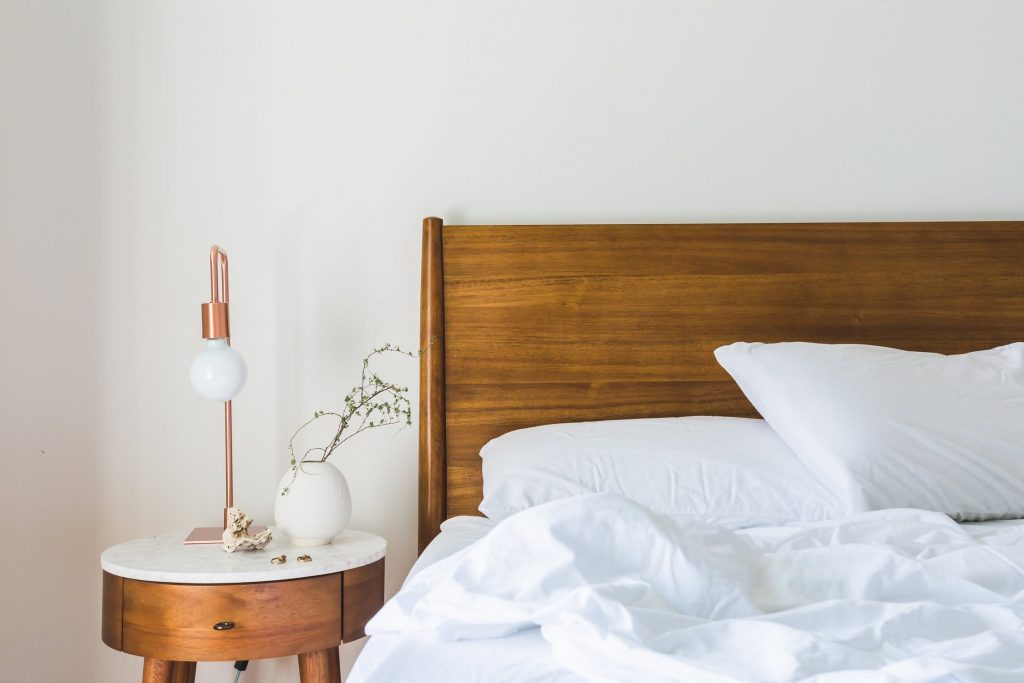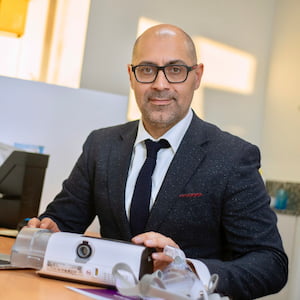On Friday afternoon of 2nd July 2021 Philips officially announced the recall for Australian customers. This was done after Philips was in consultation consultation with the TGA (Therapeutic Goods Administration) Australia.
This recall announcement comes after previous communication from Philips “Recall (USA) & Rest of World Safety Notice” from 14th June 2021 where they also suspended global sales.
The original announcement from Philips on this issue was on the 26th April 2021 where they said they were investigating a potential product defect with the sound abatement foam.
- Click here to view Philips official statement and list of affected devices.
- Click here to view the TGA Product Defect Correction alert.
What are the options for my affected device?
If you have checked the Philips website and confirmed your device is on the list you have a couple of options.
Option 1: Register your device with Philips for a repair or replacement.
- Visit the Philips website to register your serial number.
- Philips will contact you for and let you know if your device is to be repaired or replaced.
- The TGA have said “Information on the timing of this correction is still being confirmed with Philips”.
Option 2: Potential for a full refund from the distributer or manufacturer.
- Philips has advised Under Australian Consumer Law (ACL) you may be able to request a full refund from the place you bought the affected device if it meets the ACL requirements.
- This defect would be classed as a “Major problem” under ACL as it is unsafe to use.
- You need to provide proof of purchase such as a bank statement, receipt, or even photographic evidence.
- The device needs to be within the working life which they have advised is 5 years.
- If the device meets ACL, the distributer cannot refuse to give you a refund or refer you to the manufacturer.
- You need to return the device – it does not need to be in original packaging.
Here is what Philips has said on ACL:
Our goods and services come with guarantees that cannot be excluded under the Australian Consumer Law. Your rights under the Australian Consumer Law are in addition to any remedy the local Philips entity may provide you.
Philips Australia Medical Device Recall – 14/06/2021
For more information on ACL please refer to the ACC website.
The ABC program The Checkout also has a video explaining your rights under ACL.
Why is the recall happening?
According to the TGA:
Philips Electronics Australia Ltd, following consultation with the TGA, is undertaking a product defect correction for the 14 sleep and respiratory care devices identified in the tables below. This is in response to risks posed by the polyester-based polyurethane (PE-PUR) sound abatement foam component in these goods.
Philips has identified that the foam used in the blower boxes of their continuous and non-continuous ventilators may degrade into particles, which may enter the devices’ air pathway and be ingested or inhaled by the user, and release certain chemicals as gases. The foam may degrade more quickly if the device is cleaned using unapproved cleaning methods, such as ozone gas products.
Where possible, Philips will replace the sound abatement foam in affected devices. If this is not possible, a replacement device will be provided.
Therapeutic Goods Administration Australia – 06/07/2021
What is the risk of using the affected device?
According to the TGA:
Philips’ investigations identified that the majority of particles are of a size unable to penetrate into deep lung tissue and are likely to remain in the patient’s upper airway. Only particles with a diameter of <1-3 μm may penetrate into the lower respiratory tract.
Analysis of the degraded foam demonstrates the particles may include compounds such as diethylene glycol (DEG), toluene diamine isomers (TDA) and toluene diisocyanate isomers (TDI). Philips is undertaking investigations to assess whether the amount of degraded PE-PUR foam inhaled and/or ingested by a patient may potentially exceed the tolerable intake for these compounds.
The foam may also emit certain chemicals (volatile organic compounds – VOCs). Product testing has shown that this ‘off-gassing’ mostly occurs during initial operation, but may possibly continue throughout the device’s useful life. These VOCs include dimethyl diazene and phenol, 2,6-bis(1,1-dimethylethyl)-4-(1-methylpropyl).There is no known permissible daily exposure limit for these compounds.
The potential risks associated with these issues include: headache/dizziness, irritation (eyes, nose, respiratory tract, skin), inflammatory responses, asthma, hypersensitivity, nausea / vomiting, adverse effects to other organs (e.g. kidneys and liver) and possible carcinogenic effects.
Therapeutic Goods Administration Australia – 06/07/2021
Should the device continued to be used?
This part can be a bit confusing as there is lots of different information out there. We hope we can assist with clarifying some of the information.
Firstly on the TGA website they say this:
Check the list of devices lower on this page to see if your device is affected by this action.
Do not stop using your device without speaking to your physician or care provider. Stopping treatment suddenly could have an immediate and detrimental effect on your health.
If your device is an affected CPAP or bi-Level PAP unit:
Please make an appointment with your physician or care provider before making any changes to your prescribed therapy. Together with your physician, determine if the benefit of continuing therapy with your device outweighs the risks identified and discuss alternative long-term therapy options.
Please ensure you follow the recommended cleaning and replacement guidelines in the operating manual for your CPAP machine and accessories.
If your device is an affected mechanical ventilator:
Do not stop or alter your prescribed ventilator therapy.
Please make an appointment with your physician or care provider before making any changes to your prescribed therapy. Together with your physician, determine if the benefit of continuing therapy with your device outweighs the risks identified and discuss alternative long-term therapy options.
You can use an inline bacterial filter to help reduce the risk of inhaling particles of foam. These filters will not reduce exposure to the gases that may be released by the degrading foam.
Guidance on installation of the filter is found in the device’s operating manual. It is important to install these correctly as a filter may increase the resistance of air flow.
Therapeutic Goods Administration Australia – 06/07/2021
For patients using life-sustaining mechanical ventilator, this advice to continue using the device despite the risks and contact your physician before making any changes to your therapy.
For non life-sustaining CPAP and BiPAP patients, they are advising patients to see their physicians immediately to determine if patients should continue using the device.
This is where it gets confusing because the TGA are saying that the machine poses a safety hazard (as quoted directly from their website) by emitting particles and chemicals that can cause mild to severe health complications.
Let’s look at the TGA quote again:
The potential risks associated with these issues include: headache/dizziness, irritation (eyes, nose, respiratory tract, skin), inflammatory responses, asthma, hypersensitivity, nausea / vomiting, adverse effects to other organs (e.g. kidneys and liver) and possible carcinogenic effects.
Therapeutic Goods Administration Australia – 06/07/2021
What makes it more confusing is that this is a reversal of the advice directly from Philips on the 14th June 2021 where they said the following:

Philips have now amended their advice after consultation with the TGA which brings the advice inline with the TGA. See below:

The TGA and Philips have advised patients with any affected devices to contact their sleep physician and discuss options for continued treatment. We encourage all patients to urgently contact their physicians.

